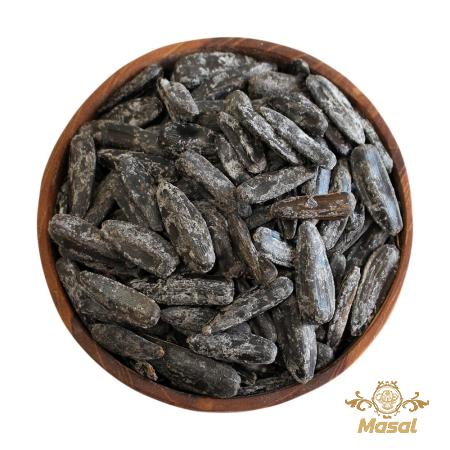Kashmiri almonds are renowned worldwide for their superior quality, rich flavor, and countless health benefits. Grown in the pristine valleys of Kashmir, these almonds have become a staple in both regional and international cuisines. In this article, we will delve into the different types of Kashmiri almonds and explore their unique characteristics, nutritional profiles, and various uses.
1. Regular or Mamra Almonds:
Regular or Mamra almonds are considered the cream of the crop when it comes to Kashmiri almonds. These almonds are known for their smaller, and plumper size, with a characteristic oval shape. Regular almonds are often soft, with a mild flavor and creamy texture that sets them apart from other varieties. They are usually consumed raw or roasted and are an excellent addition to salads, desserts, or enjoyed as a healthy snack.
Nutritional Profile:
– Rich in vitamins (Vitamin E and B-complex vitamins), minerals (magnesium, potassium, and calcium), and healthy fats (monounsaturated and polyunsaturated fats).
– Excellent source of dietary fiber, protein, and antioxidants.
– A good source of energy, promoting overall well-being and supporting various bodily functions.
2. Giri Almonds:
Giri almonds are another popular variety of Kashmiri almonds. These almonds are slightly larger and have a more elongated shape compared to regular almonds. Giri almonds are widely used in Indian sweets and snacks, providing a distinct flavor and a delightful crunch. They are also a popular choice for garnishing dishes due to their attractive appearance.
Nutritional Profile:
– Similar to regular almonds, Giri almonds are rich in vitamins, minerals, healthy fats, fiber, and antioxidants.
– Known to support heart health, improve brain function, and boost energy levels.

– The natural oils present in Giri almonds help in promoting healthy skin and hair.
3. Kagzi Almonds:
Kagzi almonds, also known as paper-thin almonds, are often favored for their delicate texture and appearance. These almonds have a tender skin that easily peels off after blanching, making them a preferred choice for desserts, baking, and confectionery. Kagzi almonds are highly versatile and can be incorporated into a variety of dishes, adding a mild and nutty flavor.
Nutritional Profile:
– Similar to other Kashmiri almonds, Kagzi almonds are packed with essential nutrients, including vitamins, minerals, healthy fats, and antioxidants.
– Known to improve cognitive function, aid in digestion, and promote healthy weight management.
– Rich in vitamin E, which aids in maintaining healthy skin and helps combat signs of aging.
4. Shelled Almonds:
Shelled almonds are a convenient option for those who prefer their almonds readily peeled and ready to be eaten or used in recipes. These almonds are manually removed from their shells, ensuring that the inner kernel remains intact. Shelled almonds offer the same nutritional benefits as other Kashmiri almond varieties and can be used to enhance the flavor and texture of numerous dishes.
Nutritional Profile:
– Similar to other Kashmiri almonds, shelled almonds are a rich source of essential nutrients, including vitamins, minerals, healthy fats, and antioxidants.
– Well-known for their ability to support heart health, regulate blood sugar levels, and aid in weight management.
– Packed with plant-based proteins, making them an ideal snack for vegetarians and vegans.

Conclusion:
Kashmiri almonds, known for their superior flavor, nutrient density, and versatility, provide a nourishing addition to any diet. Whether you prefer regular or Mamra almonds, Giri almonds, Kagzi almonds, or opt for shelled almonds for added convenience, each variety offers a unique taste and texture while encompassing a broad range of health benefits. Incorporating Kashmiri almonds into your daily diet can enhance your overall well-being and provide a delightful culinary experience. So, go ahead and relish the charm of these exceptional almonds from the picturesque valleys of Kashmir!Differentiating Factors of Kashmiri Almonds: Unlocking their Market Potential
1. Grown in the Pristine Valleys of Kashmir:
The geographical location and unique climate conditions of Kashmir contribute significantly to the distinct characteristics of Kashmiri almonds. The fertile soil, ample sunshine, and cool mountain breeze create an ideal environment for almond trees to flourish. These natural conditions result in almonds that are known for their superior taste, texture, and nutritional value, setting them apart from almonds produced in other regions.
2. Handpicked and Carefully Sorted:
One of the key factors that differentiate Kashmiri almonds is the meticulous process of handpicking and sorting. Farmers carefully select mature almonds, ensuring only the highest quality nuts make it to the market. This attention to detail guarantees that each Kashmiri almond is of exceptional quality, free from any defects or foreign particles.
3. Organic and Pesticide-Free:
Another noteworthy aspect of Kashmiri almonds is their organic cultivation. Most almond orchards in Kashmir follow traditional and environmentally sustainable farming practices. Farmers avoid the use of synthetic fertilizers and pesticides, resulting in almonds that are free from harmful chemicals. The organic nature of Kashmiri almonds appeals to health-conscious consumers who prioritize clean and natural food options.
4. Unique Flavor Profile:
The flavor of Kashmiri almonds is distinct, both in comparison to almonds from other regions and even among the different varieties within Kashmir itself. Kashmiri almonds are known for their rich, nutty taste and a slightly sweet undertone. This unique flavor makes them a preferred choice for a wide range of culinary applications, such as baking, cooking, and snacking.
5. High Oil Content:
Kashmiri almonds have a relatively high oil content compared to other almond varieties. This higher oil content contributes to the creamy and velvety texture, making Kashmiri almonds a delightful treat to consume. The richness of the oil also enhances the flavor profile, making them an ideal ingredient for various recipes and desserts.
6. Versatile Culinary Applications:

The versatility of Kashmiri almonds is another factor that sets them apart. Whether you’re looking to enhance the flavor and texture of a savory dish, add a crunchy element to desserts, or enjoy them as a standalone snack, Kashmiri almonds can be incorporated into a wide array of culinary creations. They are particularly popular in Indian cuisine, where they are extensively used in dishes like biryanis, kormas, and desserts like halwa and phirni.
7. Export Potential and International Demand:
Kashmiri almonds have gained significant recognition in the global market. Their superior quality, unique flavor, and nutritional benefits have resulted in increased demand from countries around the world. The international market has recognized the value of Kashmiri almonds and their potential to cater to the growing demand for organic, high-quality nuts.
8. Variety Packaging:
To meet the diverse market preferences and demands, Kashmiri almonds are available in various packaging options. They can be found in vacuum-sealed packs, resealable pouches, or as part of gift sets. This variety allows consumers to choose the packaging that best suits their needs, whether it’s for personal consumption or as gifts for special occasions.
9. Health and Wellness Sector:
The growing focus on health and wellness is fueling the demand for nutrient-dense foods and ingredients. Kashmiri almonds, with their exceptional nutritional profile, are a perfect fit for this market segment. They are known for their heart-healthy fats, high fiber content, and essential nutrients. As consumers prioritize their well-being, the demand for Kashmiri almonds in health-conscious products, such as energy bars, granola, and trail mixes, is on the rise.
10. Traditional Medicine and Ayurvedic Applications:
Kashmiri almonds have long been a significant component of traditional medicine, particularly in Ayurveda. They are considered a natural remedy for various ailments, including improving cognitive function, boosting immunity, and promoting digestive health. As the demand for natural remedies and Ayurvedic products grows, the inclusion of Kashmiri almonds in traditional medicines and herbal formulations gains momentum.
11. Culinary Tourism:
Kashmiri almonds play a significant role in attracting culinary tourism to the region. The unique flavor and texture of these almonds have become synonymous with Kashmiri cuisine. Food enthusiasts and travelers seek out authentic Kashmiri dishes and experiences, contributing to the local economy and promoting the region’s food culture.
12. Opportunities for Value Addition and Innovation:
The market potential for Kashmiri almonds extends beyond the nuts themselves. There are various opportunities for value addition and innovation, such as almond-based products like almond milk, almond oil, almond flour, and almond butter. These value-added products cater to different dietary preferences and expand the market reach of Kashmiri almonds.

In conclusion, Kashmiri almonds stand out due to their superior quality, unique taste, and exceptional nutritional benefits. The factors that differentiate these almonds, such as their origin, organic cultivation, flavor profile, and culinary versatility, contribute to their market potential and growing international demand. As consumers continue to prioritize health, wellness, and unique culinary experiences, the future looks promising for Kashmiri almonds, both as a stand-alone product and as an ingredient in a wide range of culinary applications.









